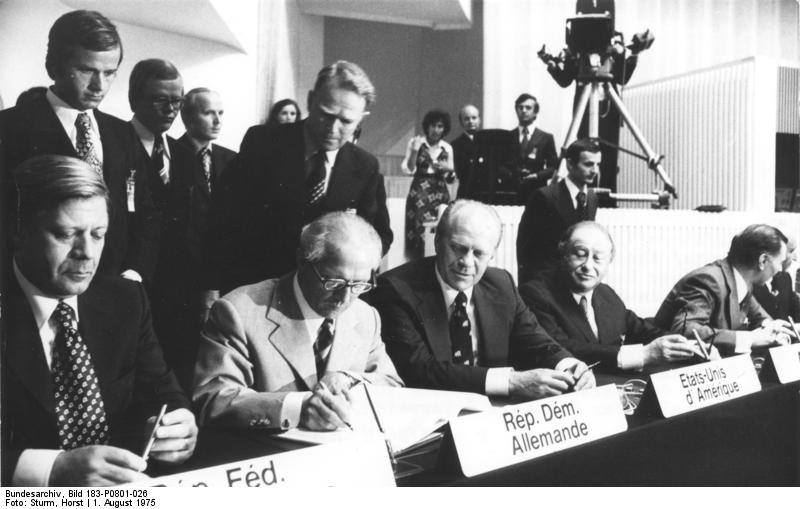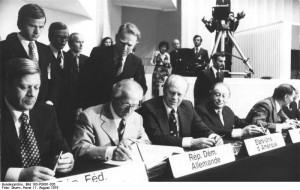

By Joe Losavio
The crisis in Ukraine has posed serious questions of international law. Russia and the United Sates have traded barbs naming each other the international outlaw, but neither has clearly articulated exactly what that means. Here is a quick primer of what legal issues are at play:
What International Laws Has Russia Broken?
On a diplomatic level Russia has violated the obligations it agreed to under the Helsinki Final Act. This 1975 agreement between 35 nations (including the then USSR) created the framework for the last four decades of European security cooperation. The Act also spurred the creation of the Organization for Security and Co-operation in Europe (OSCE) of which post-Soviet Russia and Ukraine are members, tethering both to the prior agreements in the Act.
The Act overtly reaffirms on several occasions the importance of respect for national sovereignty, territorial integrity, Inviolability of frontiers, and non-intervention in internal affairs. The Act even dictates that “participating States will refrain from any acts constituting a threat of force or direct or indirect use of force against another participating State”. More explicitly Russia violated its 1994 agreements under the Budapest Memorandum on Security Assurances. This security settlement essentially guaranteed Ukrainian territorial sovereignty and political independence against the other signatories in exchange for Ukraine turning over its nuclear weapons arsenal, and acceding to the Nuclear Non-Proliferation Treaty. It was signed by Ukraine, the US, Russia and the UK in 1994, and jointly reaffirmed by the United States and Russia in 2006.
Is Crimea’s Secession Legal?
Self-determination would seem to be a right enjoyed by all. This, however, is not the reality of international law. Several international agreements, including the Declaration of Friendly Relations, Vienna Declaration, and the UN’s 50th anniversary declaration, state that people’s rights to have a say in political, economic and social issues should not be interpreted as the right to “dismember or impair, totally or in part, the territorial integrity or political unity of sovereign and independent States”. Exceptions to this principle only arise when a group of people are under colonial rule or foreign occupation, and subject to persecution. Ukraine would point to Crimea’s already privileged status within the country, as it already enjoys a considerable level of autonomy, to dispel any accusations of Crimean repression.
What’s Next?
As nations, including the US, have often shown, interpretations of international law can be extremely malleable. Even President Obama admits, President Putin seems to have a “different set of lawyers making a different set of interpretations” about the situation. Russia claims that oppressed ethnic Russians had the right under international law to secede in Crimea.
Additionally the Budapest Memorandum’s enforcement capabilities are hamstrung by requirements that any assistance come through the UN Security Council (and meet with the inevitable Russian veto), and Russian insistence that there were no Russian troops involved in Crimea before its annexation to Russia, only “local self-defense forces” who speak Russian, sport Russian weapons, and drive Russian registered vehicles. Moreover, the Helsinki Final Acts, while unofficially governing diplomatic decorum for decades, are non-binding as they lack treaty status.
Despite the debate over legality, events in Ukraine continue to unfold. American, European and Russian diplomats continue to spar through diplomatic channels. Capitals with dark memories of Russian domination from Budapest to Tallinn, however, wonder if they will be the next case study in international law.
Joe Losavio is a Master’s student at the Johns Hopkins University-School of Advanced International Studies (SAIS). His area of concentration is International Relations and Economics with emphasis in International Law and Organizations




